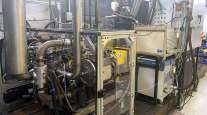Natural Gas Incentives Unlikely, Congressmen Tell Summit
This story appears in the Dec. 10 print edition of Transport Topics.
ARLINGTON, VA. — Trucking should expect “piecemeal” measures that promote natural gas use because the federal government probably is too divided to tackle comprehensive legislation that could include incentives for buying natural gas trucks, two congressmen said.
“I think what we need to do in the future is focus on some consensus we can get with the president — with both [parties] — because in reality it’s divided government,” Rep. John Sullivan (R-Okla.) said at American Trucking Associations’ Summit on Natural Gas in Trucking.
“I do think you have to go piecemeal and, in fact, even if I do a comprehensive, just natural gas bill, I bet we could break it down and pass some sections of it rather easily,” said Rep. Lee Terry (R-Neb.).
Sullivan last year introduced a natural gas bill designed to jump-start trucking’s transition to natural gas.
The bill would provide a $64,000 tax credit to purchasers of a natural gas trucks. The bill, which has 181 co-sponsors, also would give billions of dollars in tax credits to manufacturers of the trucks and to the builders of fueling stations. The measure never passed the House Ways and Means Committee.
A similar measure, introduced by Senate Majority Leader Harry Reid (D-Nev.), failed to get the necessary 60 votes to become an amendment to the transportation bill Congress passed in June.
Sullivan lost his primary campaign and will not be returning to Congress next year, but Terry said he will pursue natural gas legislation.
The main objection to Sullivan’s bill, which Terry co-sponsored, is tax credits that are viewed as subsidies, Terry said.
In discussions with experts, Terry said, he determined that subsidies are not necessary to encourage the use of natural gas. Rather, to lure investors and consumers into the natural gas market, Congress must keep government from overregulating the fuel’s production and use, he said.
Meanwhile, one area with probable consensus is a weight exemption for trucks with natural gas fuel tanks, which are heavier than diesel tanks, Terry said.
“Why buy a nat gas truck, if you can’t carry as much cargo?” he asked. “It doesn’t make sense.”
Another area of consensus could be on the federal excise tax, Sullivan and Terry said. A natural gas truck can cost $60,000 more than a diesel-powered truck.
“So, on the price difference, why should you pay the additional excise tax?” Terry asked.
The third area where Democrats and Republicans may reach consensus to promote natural gas use is on fuel taxes.
As it is, federal fuel taxes are based on gallons purchased, which disadvantages natural gas users because it takes more than a gallon of LNG to get the same British thermal units, or Btu, of energy from LNG as diesel. Some natural gas advocates have suggested taxing Btu instead of gallons.
In a separate panel during the conference, experts said there are risks for truckers who abandon diesel but also risks if the transition to natural gas is not accelerated.
In 2015 or 2016, railroads powered by natural gas are expected to debut, said Laurence Alexander, managing director of Jefferies & Co. Inc., New York. “That’s going to make life very interesting for truckers who try to compete on the long haul,” Alexander said.
While natural gas prices are currently low, there is no guarantee that will always be the case, said Jim Turnure, director of the Office of Energy Consumption and Efficiency Analysis at the U.S. Energy Information Administration. “We’re not sure how or when that global market might start to act more like the global oil market,” he said.
The natural-gas risk for trucking in the future is “who else wants to buy it,” he said. “The electric power sector wants to buy it, and the industrial sector wants to buy it.”
One reason natural gas will continue to become more popular is because it is less polluting than fossil fuels, said Alan Krupnick, senior fellow and director of the Center for Energy Economics and Policy at Resources for the Future, a Washington think tank.




